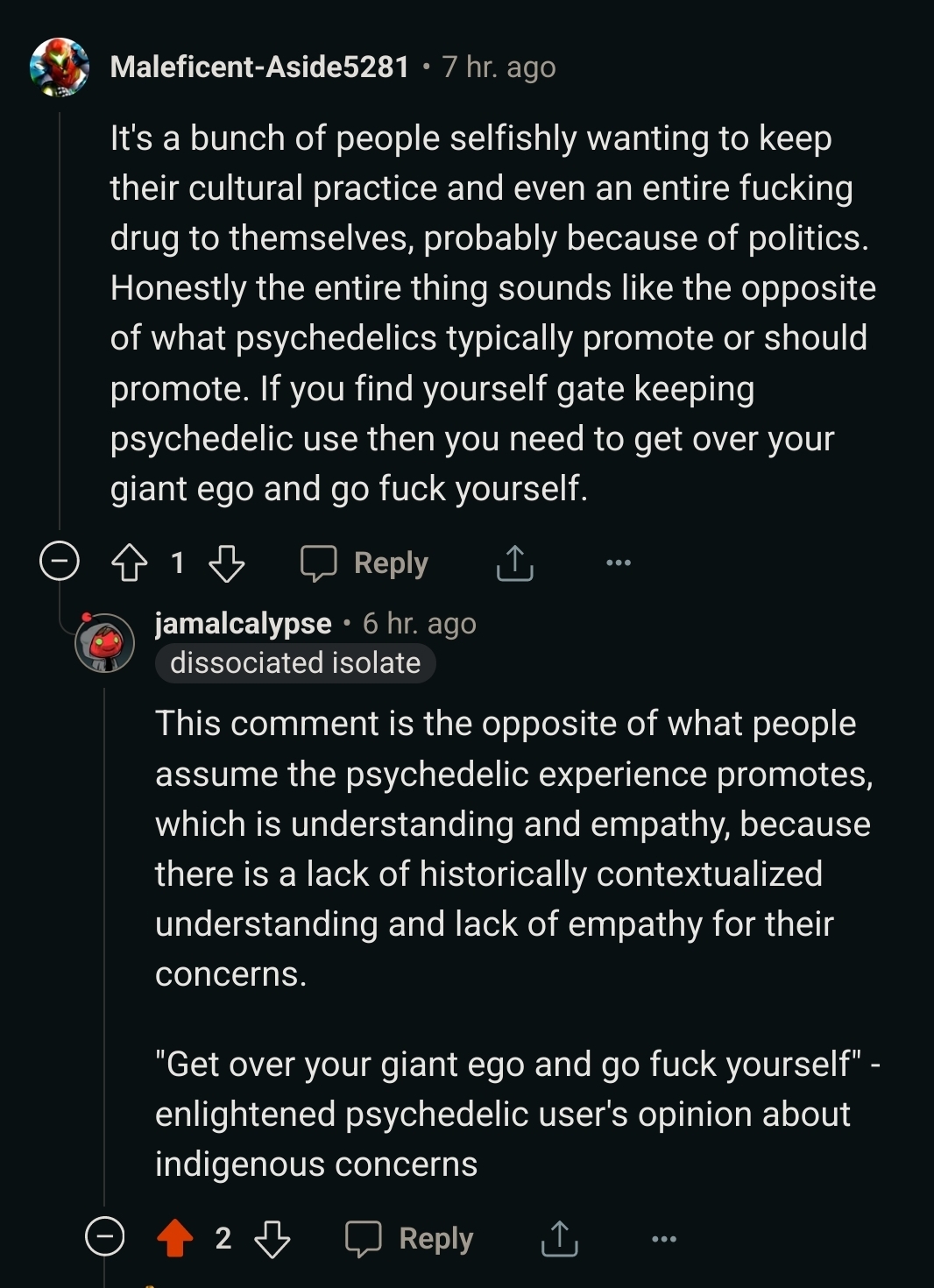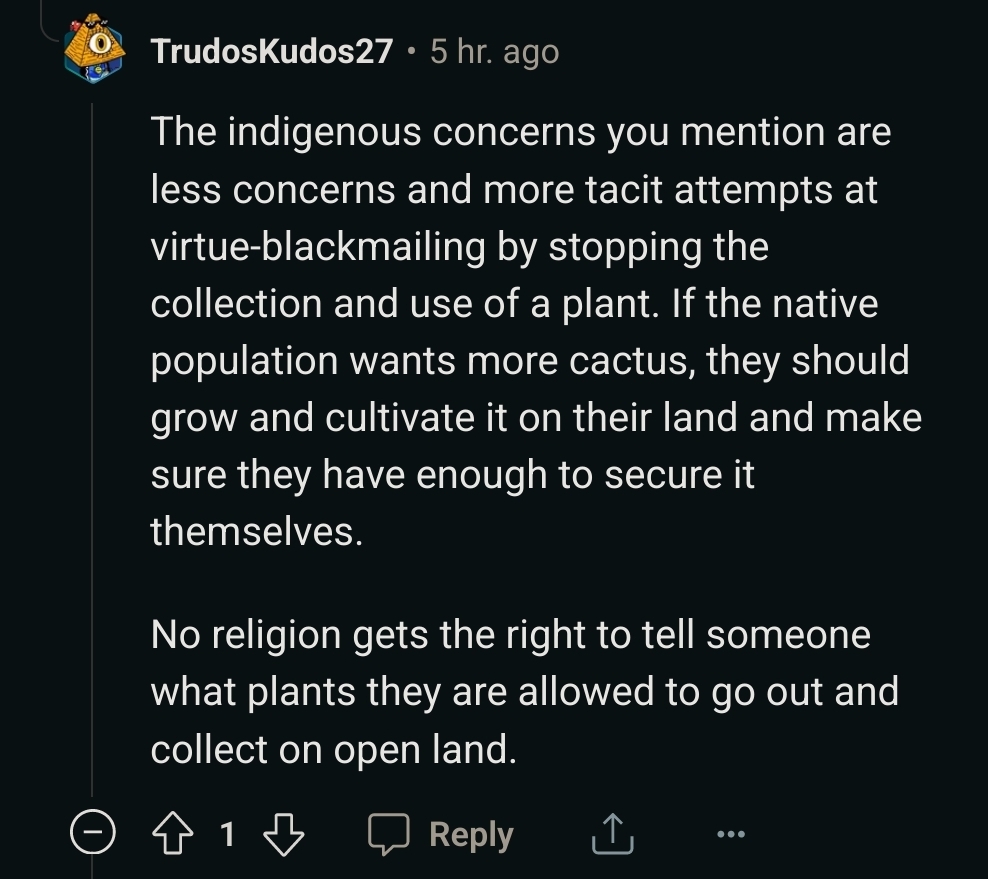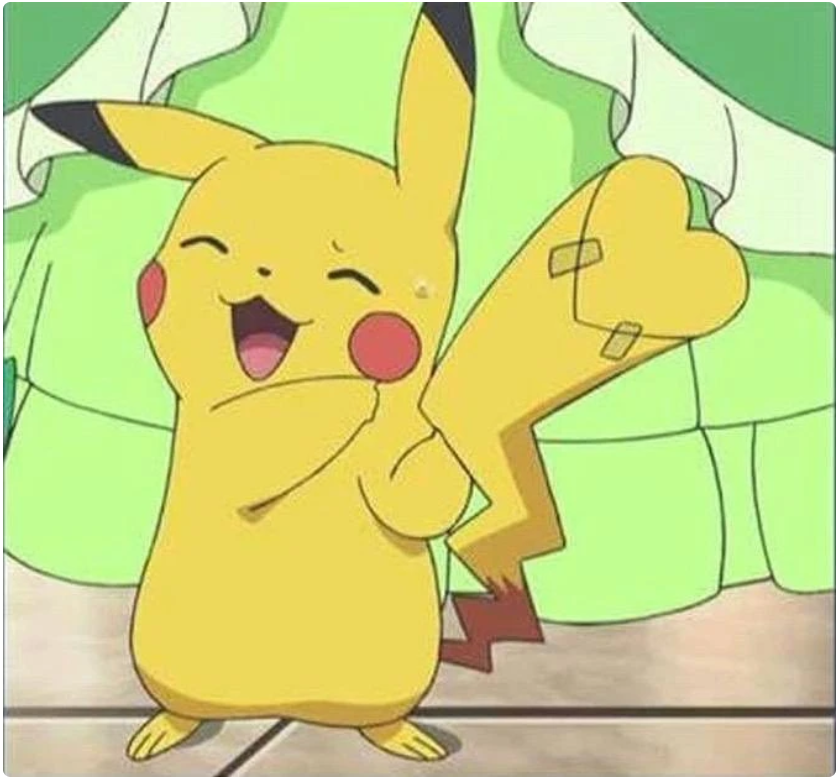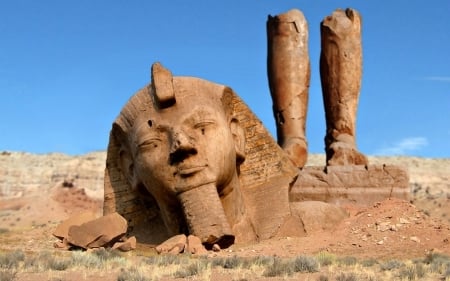

https://teddit.zaggy.nl/r/Psychonaut/comments/18mth6c/peyote_is_the_darling_of_the_psychedelics/
Honestly this whole thread is a cesspool, pure psychic damage. There are literally functional alternatives, but still these self-enlightened egolords can’t keep their fucking hands off an endangered plant. The prevailing attitude looks to be “Its there, so I i am entitled to plunder it”
Although Anderson sympathized with the landowners, who wished to make their land productive and protect themselves from litigation by anyone who was injured on their ranch while collecting peyote, the closure of peyote harvesting grounds produced “serious tensions” between indigenous people and the ranchers. According to Salvador Johnson, the largest peyote distributor in Texas, 100 percent of the land in Texas where peyote grows is privately owned, which means that if peyoteros are going to harvest peyote, they need permission from landowners.

https://www.vice.com/en/article/zmdzbw/the-decline-of-american-peyote-v24n5
Typical white pig doesn’t understand why he can’t eat all of a sacred endangered plant that takes 30 years to grow.
OINK OINK MUST CONSUME.
THE TREATS MUST FLOW
the treats must flow as easily as this badly photoshopped image of microcars I made where the cars are 5x smaller in order to give the illusion that expanding car lanes would increase transit productivity
also if you use magic mushrooms you have a moral duty to know what happened to María Sabina
aww what the hell, fuckin kkkrackers

TIL about the MKUltra connection to what happened to her
thats the part that gets me!! how is the cia at the crime of EVERY bad thing in Latin America.
If something happened in South America in the last 80 or so years, “CIA did it” is an appropriate response 99% of the time.
Tbh whites should not use magic mushrooms at all.
Tbh whites should not use magic mushrooms at all.
How deep does this argument go? Should white people also not use synthetic psilocybin as a migraine prophylactic? Psilocybin or derivatives shouldn’t be used to treat depression?
I agree that the dominant psychedelic culture (especially in amerikkka) fucking sucks, is riddled with abuse
I guess I’m just having trouble following the argument that because the CIA and associated colonizers committed atrocious acts to Sabina and her family and community every other imperial subject should cease using a compound (or derivatives) that humanity has historically used in Europe, Asia, and Africa.
i read somewhere i cant find it now, that it didnt matter if outsiders use the drug because the magic has already been killed
 but if the indigenous people thats use it say otherwise or change their mind yes 100% no question. anyone using peyote outside of the church approval is i giant piece of shit.
but if the indigenous people thats use it say otherwise or change their mind yes 100% no question. anyone using peyote outside of the church approval is i giant piece of shit.anyone using peyote outside of the church approval is i giant piece of shit.
hell yeah i love giving religious orders authority over non-adherents
White governments are keeping this shit a felony in the first place. I’d think ending the criminalization of indigenous substance use is necessary before moving forward with anything.
im talking morally not legally, obvi i dont want the state involved.i agree
 There are psilocybin mushrooms that are native to Europe that have been used by"white people" for millennia.
There are psilocybin mushrooms that are native to Europe that have been used by"white people" for millennia.Gate keeping who is allowed to use psychedelics based on their race is fuckling stupid. Should African Americans be barred from smoking weed if they aren’t practicing Hinduism?
I don’t think it’s a matter of gate keeping the drug do much as it is of keeping the plant from going extinct due to over harvesting. Grow your own peyote (most won’t bc they lack the necessary skills and patience, even if they have an appropriate climate) or just use other psychedelics.
Watched some Crime Pays But Botany Doesn’t about “growing cactus from seed” and it’s about indigenous people growing peyote (and other cacti).
They’re already overharvested and dying out in the wild. Fuck off white psychonauts.
Love this channel
I found a YouTube link in your comment. Here are links to the same video on alternative frontends that protect your privacy:
As someone who loved drugs back in the day, I always told people that they should grow their own San Pedro’s or another common mescaline cactus and not peyote. I know a guy whose entire house is filled with different species of peyote, literally every inch of his floor covered in pots. He had trichoceruses he kept for tripping. If it didn’t keep him busy and happy with himself, I’d say it was a hoard. But he was growing for repopulation and regularly planted around town, so it’s healthy-ish for him. Got himself off heroin by growing peyote for repopulation, not by taking it. He was the only white guy I’ve ever met that taking peyote would be perfectly ethical, but still didn’t do it
It’s not hard to be respectful. Especially when San Pedros are legal and extremely easy to get.
tacit attempts at virtue-blackmailing
 this redditor has no concept of shame left
this redditor has no concept of shame leftTBF, I’ve abandoned shame in myself as well, I see it as a form of social control I don’t need or want in myself. The main problem is that they didn’t decide not to feel shame, they just became immune due to an over-abundance. That was their only moral check, was not looking bad to others. Once they lost it they have nothing holding back their appetites.
sounds good and healthy tbh - and yet you still know the word shame. What I felt was so funny about the part I quoted is, that it seemed like the guy struggled to verbalize the very concept of shaming and as such defaulted to construct something with a virtue-component (that’s what the libs have right) and ended up with this hilariously over-complex-yet-primitive turn of phrase. Virtue-blackmailing alone just kinda sent me
Not saying shame is a good thing to cultivate or w/e
Oh, gotcha
I read the original article and the only thing I have against it is the anti-synthetic peyote stance they have. I get it’s a sacred plant but if the option is people foraging it to extinction or letting them have a lab grown version then just let them make it in the lab. As much as I support indigenous folks in their anti-crakkker stance they don’t have the right to the molecule itself especially if it isn’t derived from peyote.
I assume that’s the point of the first comment. Not “Let me forage this plant to extinction” but “If you say I can’t have a synthetic version and I can’t forage then what do you want me to do?” Just let them have the lab-grown stuff and keep the plants yourself. Less foraging, psych folks get their trips, everyone’s happy.
Yeah i re-read the article a few times and came to a similar conclusion. At the same time - if they have an issue with white colonizers using synthetic
Peyotemescaline, is that not also worth consideration and empathy? It subverts the supply issue, but it feels to me (as a white colonizer) like approptiation of someone’s culture, against the protest of the people who’s culture is being appropriated.Should we really be forcing onto any indigenous peoples our views of whats “fair”? There exist many alternatives to mescaline, and I think their desire to not have it commodified and shared should be respected.
Removed by mod
Its a thorny issue but I think youre way off the mark. It’s not about a molecule, it is about cultural “capital” built up over hundreds or thousands of years, and then that culture being taken apart, bit by bit, anything of value gets commodified and repackaged to colonizing people, alienating and severing it from its cultural significance, and anything else that can’t be made into a commodity is subsequently destroyed or otherwise alienated from as much of the past and the culture as possible. Its part of a process of domination. Youre basically making the same argument as the above dunk subject, that because this substance has been intentionally, forcefully and painfully alienated from its original cultural significance, that it is inherently alien. Shrouding this argument in the language of science doesn’t work either: in my opinion we should be suspect of the language of science and its seemingly disaffected and intellectually distanced, sanitizing affect. In this case, as in most cases, science is political.
Noone really teaches us the definitions of cultural appropriation and I don’t think that even most leftists have a solid formulation for it. So I don’t blame you but you’re making a big error here.
I use the term “capital” above because that’s what its become, due to the totalizing quality of capital, but the real cultural and historical significance is beyond my ability to comprehend. We have to trust the victims of erasure, otherwise we are just chuds
They don’t have a right to the chemical structure of mescaline though. It’s like saying Chinese tea growers have the right to bar western people from drinking energy drinks because they both contain caffeine.
My dude, what? We’re talking about settlers appropriating the culture of indigenous Americans. I’m not versed in the history of the Chinese Tea trade, but it has historically been exported and shared. The key difference being “Exported and Shared”. Willfully sharing parts of your culture with other people is not at all comparable to having it be appropriated by colonizers despite your express protests.
Would you stop taking Aspirin if Egyptian people said that you were appropriating their use of willow bark?
Willow trees grow worldwide, and people generally use the resources that are available to them. There is definitely a case to be made about the imperialist nature of western medicine, but that is a completely separate conversation from what we’re talking about here.
They have a right to the rituals, images, and other unique elements of culture involving peyote. They do not have a right to the chemical structure itself.
Why are you so intent on determining what parts of their culture they have a right to and which parts they don’t?
Why are you so intent on determining what parts of their culture they have a right to and which parts they don’t?
seems real weird to say a microscopic chemical is part of a culture. Like we don’t buy chromosome arguments from transphobes because gender was established before we knew about them and before that cultural meaning could’ve existed.
we absolutely should be respecting indigenous people. if they say we shouldnt use it then we shouldn’t use it its that fucking simple. its not some random people either the church is the one saying it. if you cant do that you are a settler and an asshole. youre not entitled to treats! its not a necessity, recreational drugs have the be the most treat like treats.
Removed by mod
Can you help me understand what you mean, or point me in the right direction? I’m not exactly a well-read Marxist and I’m not trying to hide it
Removed by mod
Good post!
I appreciate the response - I understand what you are saying. I do want to clarify that I’m not trying to argue from an arbitrary moral/idpol perspective. In the article in the linked thread, they interviewed a person who is a part of the Navajo nation, who argues explicitly against the consumption of Mescaline for outsiders, synthetic or not.
“How would Christians feel if Jesus Christ was cloned?” asked Justin Jones, a Diné peyote practitioner and legal counsel for the Native American church of North America, a non-profit organization that advocates for more than 300,000 members. “And while the real Jesus is protected, people could do whatever they wanted to the clone.”
Creating synthetic mescaline in a lab or growing peyote in a greenhouse is a violation of natural law, and interrupts the unique symbiotic relationship with the plant. “What western scientists call mescaline is for us the essence of the medicine,” said Jones. “It is the soul of it and what makes it holy.”
If I am understanding you correctly - that would shift this from being a purely value-neutral form of appropriation, to being actively harmful and disrespectful.
Does it? I kinda feel like you’re approaching the idea of listening to native voices uncritically. Protecting their practices and ability to practice their culture is important, but the idea that their religious beliefs about nonpractitioners should be enforced isn’t acceptable, just like it isn’t from any other religion.
Certainly we should be protecting peyote, returning the lands it grows on to the tribes/NAC, and stopping others from harvesting it, but there isn’t a justification for stopping people from using mescaline that was created sythetically or grown from other cultivated species. The theft and oppression that stops them from practicing their religion is harmful, but just using mescaline derived from other sources doesn’t affect them or their ability to practice.
I think some context is lost here, is the plant the culture, or the ritual surrounding the plant?
Catholicism uses wine in a ritual form in a very integral part of the religion, but wine itself is naturally occurring when you forget about your berries in the jar.
If these people were going around performing the entire native ritual in some commodified way, it’d be 1000x more horrifying than tech bros wanting to get loopy.
According the the person interviewed in the article, it is the plant, and the chemical itself.
Creating synthetic mescaline in a lab or growing peyote in a greenhouse is a violation of natural law, and interrupts the unique symbiotic relationship with the plant. “What western scientists call mescaline is for us the essence of the medicine,” said Jones. “It is the soul of it and what makes it holy.”
There’s definitely a branch of “Psychonauts” that want to engage in the whole ritual practice (See all these psychedelic retreats/therapies/ayauasca “experiences”), but it sounds like many of them don’t want the chemical commodified at all either.
if they have an issue with white colonizers using synthetic Peyote mescaline, is that not also worth consideration and empathy
Edited because I think I misunderstood the argument you’re making. Apologies for being a big dummy.
I can absolutely see why commodifying mescaline or rituals associated with constitutes harmful appropriation of indigenous culture against their expressed desires, but I don’t see why synthesizing (or growing and extracting at home) a substance outside of the context of its traditional use, and using it privately is harmful. Obviously it’s done against the expressed preferences of a culture that has used the chemical for centuries+ but I’m encountering some trouble accepting the notion that a being colonized necessarily prioritizes one people’s spiritual belief over private drug use.
If this also completely misses the argument you’re making, I apologize.
 Who says it’s open land, mother fucker, who?
Who says it’s open land, mother fucker, who?Removed by mod
Sure, but Peyote takes 10-30 years to grow in a very specific climate, and is endangered due to overharvesting. Growing your own is one thing, but exploiting an endangered plant and telling the groups that use it to “Grow it on their own land” is blatant colonizer behavior.
is pandanas an endangered species? the cactus is.
If whitey wants peyote, whitey should grow it on his own land, it’s all stolen anyway.
Removed by mod
No one should be harming the plants in that case
except for the indigenous people who have used it for over 5000 years with no problem right??

Removed by mod
Indigenous growers know how to harvest the plant safely. The problem comes from colonizers taking the whole plant or clumsily over harvesting and killing it
Tigers also harvest pretty poorly
deleted by creator
there’s also like 50,000 Native Americans in the SW, and 1,300,000,000 Chinese so I think sustainability isn’t an issue
deleted by creator
Mescaline lasts too long anyways
Edit: apparently I’m 20 minutes late and 4 other people said the same stuff. Oh well.
I think there is more going on than just “it’s ours, you shouldn’t have it” though. Peyote in the US is designated legal for religious use by indigenous people as part of traditional practices only. It’s also extremely slow growing and requires very careful harvesting to keep the plant alive, it’s listed as an endangered species in the wild, explicitly due to over-harvesting.
Basically people using it as a recreational drug can have a very real impact on the legality and availability of the plant for indigenous people.
The people in the OP are not engaging with any of this stuff and treating it simply as culture war, with an attitude of extreme contempt and hostility to the people who they see as potentially stopping them from getting high, which I find pretty gross - regardless of whether you think it’s fair to gatekeep the plant.
Basically people using it as a recreational drug can have a very real impact on the legality and availability of the plant for indigenous people.
they shouldn’t need a legal exemption but democrats support the war on drugs i guess.
Removed by mod
Ok, if you want to have the cultural experience, then fucking do so like many Western defectors to First Nations did.
Go through all the rituals that a person of that actual culture would, learn the language, immerse yourself for decades, and then, maybe, you can have the treat plant.
How hard is it to just take acid
Acid is kind of a trash drug. Try some coke or some H
Want this guy to get so high his one brain cell pops, bizarre way to talk about things
I don’t think people should be fucking with these psychedelic alkaloids for recreational purposes, many of them result in dangerously high blood pressures.
Treat piggy wants the peyote!





















